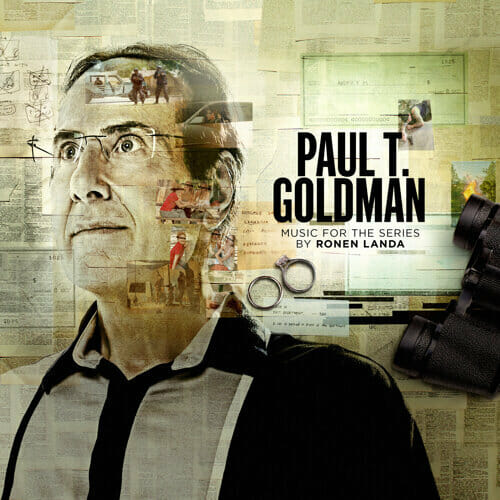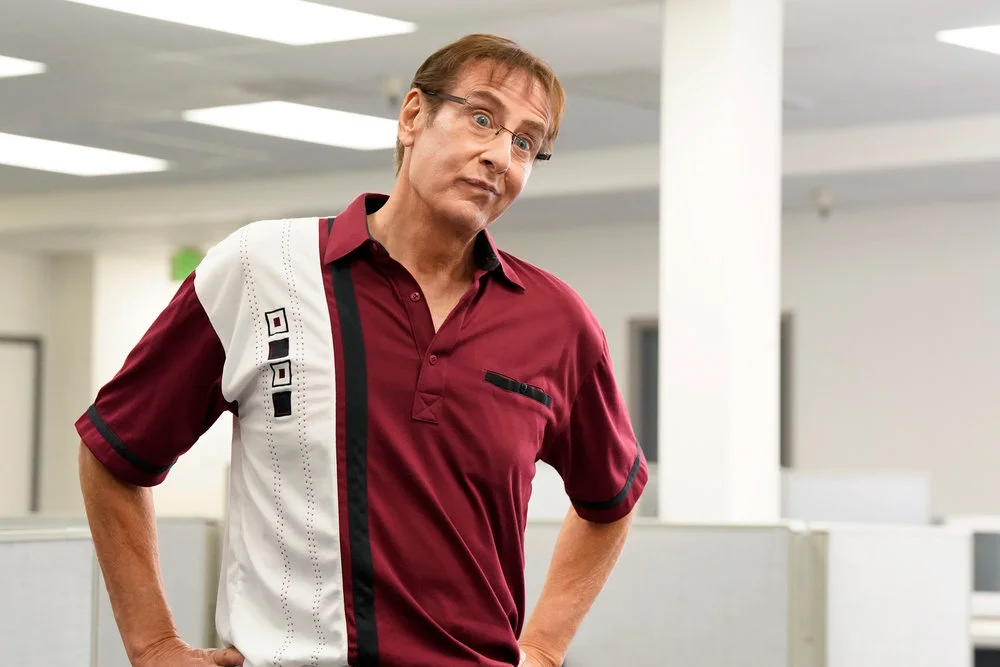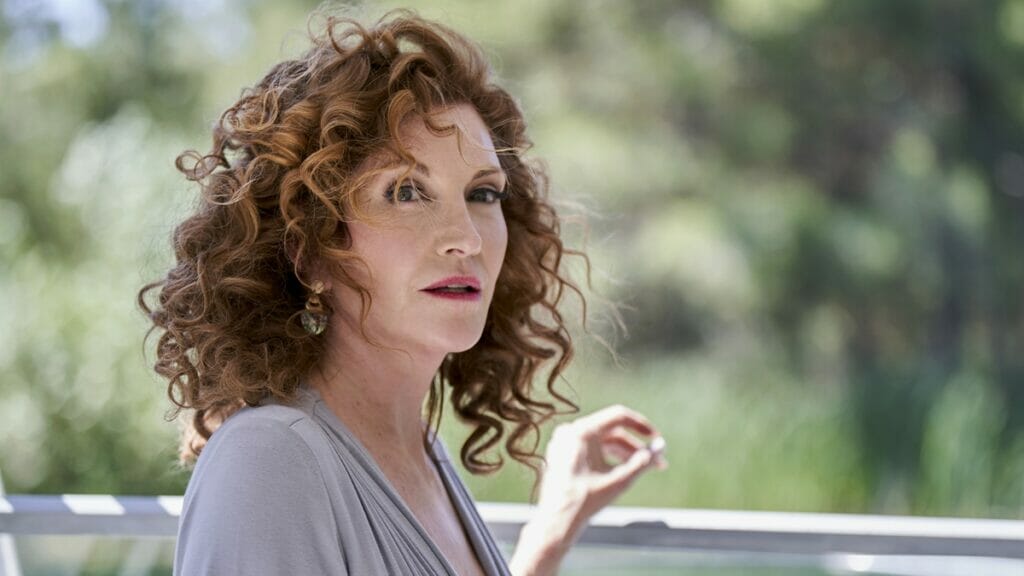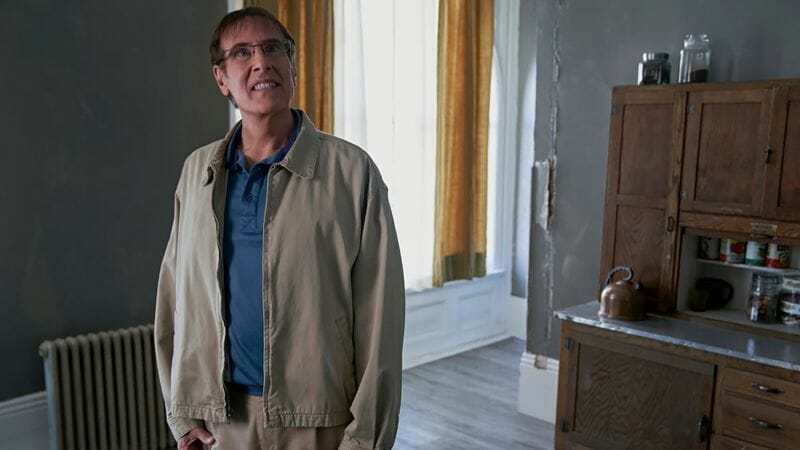Welcome to Right on Cue, the podcast where we interview film, TV, and video game composers about the origins and nuances of their latest works, and select commentaries from some of the score’s most important tracks.
How do you write the score to someone else’s self-mythology? That’s the challenge this week’s guest, composer Ronen Landa, faced for one of the year’s most idiosyncratic, difficult-to-describe shows, Peacock’s Paul T. Goldman. A strange mix of documentary comedy and wish fulfillment, the show follows the titular man, a nebbishy middle-aged guy who turned his hellish marriage to his second ex-wife into a grand quest for justice in the form of a bestselling self-published novel (and subsequent script adaptation).
With the help of Borat Subsequent Moviefilm director Jason Woliner, these take the form of compellingly straight-laced reenactments of Paul’s life as he saw them, with the man playing himself, surrounded by professional actors at once bewildered and fascinated by his presence.

It’s a wild, weird mix of true crime and true-crime satire, a needle that Landa was very careful to thread. He constructed his score much like a concept album, bringing in an intimate ensemble with strings and piano to record a lend Paul’s search for truth — as blinkered as it may or may not be — a sense of grand, personal tragedy. Then there’s its ominous main title theme, with harsh, lurching low piano chords surrounded by mysterious strings and building brass.
Together, Landa and I speak about building the score for Paul T. Goldman without seeing much of the finished product, folding the theme on top of that, and embracing the enigma of its strange, compelling central figure. And Ronen also talks us through two of the show’s biggest cues, including its mysterious title theme. We also end up chatting about his upcoming musical dip into the world of Star Trek.
You can find Ronen Landa on his official website.
Paul T. Goldman is currently streaming on Peacock. You can also listen to the score on your preferred music streaming service courtesy of Lionsgate Entertainment.
This interview has been edited for time and clarity.
First off, how did you get the gig for Paul T. Goldman? Were you sought out? Did you audition for it? How did that work?
It was a really lucky situation because, as you said, it is a one-of-a-kind show. I think a composer’s dream, or really anybody’s dream, is to get to work on a project this inventive. My good friend, Michael Maguire, was the director of an independent film I scored a few years back called Aquarians and was working as a producer on the project. He contacted Jason and the rest of the team over there and asked me for some music. He sent me the pilot, and it was just so mind-blowing. So I organized a submission, and we had a conversation. Ultimately, they offered me the job. It was a real serendipitous, wonderful experience to be involved with them.
What conversations did you have initially about how this should sound, what touch points you should be using, and even how to treat Paul as a character?
Paul is an interesting character, and I was given some very direct language. I will keep that between me, Jason, and the crew because I don’t want to color anybody’s impression of Paul. I think that’s really the beauty of the series: you get to discover who Paul is. But ultimately, this is a story of mystery and intrigue. It’s not just the outward-facing intrigue of the story that we’re so engrossed with — we’re engrossed with the mystery of the character. Who is this guy? He’s a real guy; he’s not just a written character. A real, living, breathing human being who’s going through some things, and we want to investigate who he is. We have to try and unpack that. Is he who he seems to be? Is he something more threatening? Is he something more innocent? We’re really trying to unpack that throughout the course of the series.
The main theme was designed to get at that. And if you listen carefully, I hope we’ve communicated these ideas. There are little touches throughout the main theme that kind of allude to that. Is this a person we care for? Do we share his hopes and dreams? Or is this a person we should be more suspicious of? The brilliance of this series is in asking, and I think, actually getting close to answering many of those questions.

There are so many layers to that, especially in the theme. And the score you’ve composed often fits into or plays into the mold of true crime. There are the mysterious strings and piano and all this mystique and interest in intrigue that you’re bringing us into. But as you said, like there are multiple layers to the mystery with Paul, where at once we want to solve the mystery with him. But we also want to solve the mystery of Paul.
This was clearly a passion project for Jason Woliner, who started this process more than ten years ago when Paul reached out to Jason initially. This was clearly something that Jason was so invested in. He’s a brilliant comedic director, and his other successes opened up some doors to see this one through. And I’m so glad he did. I know I’m not alone in that; it’s sometimes funny to talk about the show as a show that I worked on because I’m just such a fan of it, and I’m so completely enamored with the talent that I got to hang out with, these brilliant minds. To a degree, I think I have to include Paul: I got to meet him at the end of the process, at the premiere, and communicated with him a bit. Even getting to meet Paul is something I can be grateful for.
What’s it like to be in his orbit?
It’s funny because I’ll mention the show to friends, they’ll come back to me after watching two or three episodes, and they start peppering me with their theories of Paul, which is so funny. I think he’s actually, through this process, trying to find that out. I already know a lot of the answers, but I think Paul is Paul at the end of the day. It’s such an honest documentary in so many ways; you think you’re getting taken for this crazy ride and are, in a way. There’s this nod to cinematic manipulation; if you watch it, Jason is a character in his own documentary. He sets himself up, narratively, to be the villain in a way. Despite playing with those tropes so brilliantly, he presented a very honest portrayal of Paul. For all the beauty of his person and all the flaws of his person, they’re all really right there. I think that’s what made him such a compelling character.
Because you didn’t meet him until the process was done, what your understanding of Paul was, as I understand, chiefly through the footage you were scoring to.
I got to watch the episodes as they were happening. It was an interesting music process because, for this show, they were scoring it like a documentary; they wanted the music to follow documentary form. It was a different process where I wasn’t scoring the footage but rather ingesting all these cinematic themes and ideas coming through the storytelling. And they asked me to write a concept album.
So what we really have at the end of the day is a concept album that I wrote. And they wanted to be able to edit it in the way that would be most compelling. What’s really interesting is that the music I wrote for the program is all from Paul’s perspective; it’s as close as I could try to understanding Paul’s POV throughout this series and writing that music. That’s not the whole series. But that is an important part. I think they edited my music as this kind of expression of Paul’s own mindset. So that was pretty cool. And the music in the concept album is a little different than the final series.
The main theme was more closely scored to the picture. I’ve done the concept album thing before, and it’s a different process in some ways, but in some ways, it’s the same process. But I like that it allows me to zoom out and really consider the series’ themes and the character and find a musical language to speak to that. And we landed on this noir-inspired, jazz-inflected score that I’m so proud of. We had a wonderful time recording with a small string group, a piano, harp. But it’s all layered with these B3 organ undertones that gave it this noirish feel. I’m really, I’m really pleased with how it all came out. The main title was a little different; it was a full orchestra.

How big was the orchestra for the main theme?
The orchestra was actually both groups layered, so we actually had our chamber group playing for the main title, and then you know, the orchestra swells underneath. All told, we had close to 50 players on the main theme, which is nice for TV. You don’t get to do that for a lot of documentary TV, and not many comedy shows get to do that. I still don’t know which genre this show is. So I guess for all of them.
But unless you’re doing one of the big fantasy epics, it seems like that kind of orchestra is definitely a treat. So that was actually recorded by the orchestra remotely in Budapest. I want to say it was like a 4:30 am downbeat in Los Angeles, so my memories of it are a little foggy. I was definitely sleep-deprived [Laughs.] But you know, they did, they did such a beautiful job. I like working with the orchestra over there. Obviously, it’s not the same as being in the room and hearing it, as we did for the rest of the recordings. But this and the rest of the recordings were just an absolute treat; it was a real dream recording session.
I had some of my favorite musicians playing on this score, including longtime collaborator Lev Zhurbin, who is formerly a violist, but these days, he mostly plays an instrument he has dubbed the fadolin, which is a six-string fiddle that is basically like a full Viola, full violin and half a cello in terms of its range. He’s had a few of these built, and they all sound slightly different. This one is kind of closest in tone to the viola. But it was really cool. That end tag at the end of the main theme is his performance. And he flew in from New York to be a part of the recording session, which was really generous, and such a sweet treat to have him on the recording sessions.
Going back to the concept album idea, that approach has always fascinated me — where you’re not necessarily scoring the picture. You’re building off of these ideas, and then it gets slotted in later. What information were you working from when building the sound of the album? Was it just what you knew about Paul and what you saw with the pilot?
It was a combination of both. We had talked about some musical references, and they had music in the pilot. So you know, that musical world was already somewhat defined. But then, it was really a matter of finding the emotional themes and touchstones we needed to express and convey in the series. Working with the director and the producers, we came up with a list of thematic ideas we wanted to express, which was my starting point. And so we started writing some themes and got feedback on those.
I think my earlier takes on it were a little wackier, a little quirkier, and more leaning into the comedy of it. But they really wanted the music to — I think this was the right call — really be from Paul’s perspective. To do that, the music had to play it straight. It could not be funny music. The show is funny, and sometimes the very serious music was edited comedically, which I loved. That was absolutely the right direction to do it.

And what ended up happening was that we really loved a few themes, so I would elaborate on those themes and come up with additional concepts based on a melody. There’s one melody in particular where I think we did three or four versions of different settings. And we had a lot of fun with it. I think it really kind of informed the creative process.
Playing it straight is one of the things I think is most effective. If you Mickey Mouse-d it, if you’re like, “Ooh, look at this wacky guy,” you would lose that desire to look into his own sense of grandeur. Because he truly does see himself as the hero of the story. And the music needs to reflect that.
I think you get that in the title too, and that was really the reason that we hired an orchestra at the end of the day. It needed to be the full Hollywood treatment for Paul because that’s how Paul sees his story. And in some ways, that’s what his story is. In one of these weird convergences, the way that Paul viewed his whole experience is ultimately how it transpired for him, with the real Hollywood treatment, including an orchestra on his main theme. Which he communicated to me is his new favorite main theme. So I’m particularly proud that Paul liked the theme.
Even his moments with Frank Grillo, anytime he gets to sort of soak in the professional production value that someone is giving to his life. He lights up in this incredible sort of self-effacing way.
You reprised some motifs — there are alternate tracks for “Authors’ Note” and “I Didn’t See.” Were those different ideas and themes that you were building certain ideas or aspects of Paul’s story that you built themes around?
“I Didn’t See” is a really, really good example. You know, there is this plaintive aspect to Paul, this trial, this attempt to overcome his self-perceived weaknesses. And I think I really wanted to express that in that particular melody. Ultimately, you know, that cue ended the whole series with the final credits on the most masterful final episode, which I happen to think (and I really say this as a fan of the show) is just one of the best episodes of television I’ve ever seen.
I was really honored that they chose that. That melody is one that I’m very proud of and really gets to Paul’s heart. And I think he has a lot of heart, and some people don’t feel that way. I think his flaws are laid bare by the series, but at the same time, he is a very well-meaning person and wanted the best outcome. Someone who deeply feels everything he is going through, even if it’s somewhat imagined.
Getting at the core of everything Paul’s going through are these relatable feelings of isolation and rejection like you need to instill a sense of purpose in your life. He takes them to these degrees you wouldn’t expect to hang a TV show around.
And he’s so relatable, which is one of the magical aspects of Paul. Everyone I’ve talked to, there’s something about Paul that resonates with them and they see in themselves. That experience of feeling suckered or taken advantage of is something that many people relate to. And a lot of people, I think, have similar kind of fantasies about how you can kind of get back at a situation where you feel taken advantage of.
We’ve all wanted to go from wimp to warrior at one point.
Exactly. Yes. Yes. He put it so well in poor language. And you know, there are T-shirts that you can actually purchase. They’re Paul T. Goldman’s continued efforts, so they won’t support me. But I’d rather buy the soundtrack.
We’ve also always wondered who’d play us in a movie or a show, and God. what a treat it would be to be played by Josh Pais.
He was incredible. But what a treat to be able to play yourself too, I mean, in a weird way. Isn’t that the fantasy? Like, oh, not only will I be played by a movie star, but I am a movie star. And it’s a kind of meta show in that way. But the way that he had these fantasies and was granted these fantasies, that’s such a unique show in that way too. However, Jason has said that all those ideas always came from Paul. It was never Jason saying, “oh, you’re gonna play yourself in the show,” it always came from Paul, even though Jason wanted that outcome. You know, he’s been pretty clear about that, that, you know, they, they were always following Paul’s lead. And in that way, following the show where it went.
I know; it’s what happens when you deliberately don’t say no to your creative lead and see where everything goes.
As a composer, I was lucky to flip that around from the collaborative side to work with people in that spirit. They certainly had a vision for their series, as any showrunner or director would. But they were an incredibly collaborative and supportive group of people who really encouraged me, and we just had a lot of fun doing this music.
I think those recording sessions are days I will never forget; they’re really some of the best days of my career. Working on all sides with people I love in the booth, the musicians, and the show’s creative team. It was an absolute dream. I won’t forget that I was lucky to work on a series that was so inspiring and on music that felt really authentic to me. I think a composer is always looking to express themselves within the context of these series. It was a wonderful, really great experience.
Read next: The Spool's Best New Releases
Streaming guides
The Best Live TV Streaming Services With Free Trial
The praises of live TV streaming services don’t need to be further sung. By now, we all know that compared to clunky, commitment-heavy cable, live TV is cheaper and much easier to manage. But just in case you’re still on the fence about jumping over to the other side, or if you’re just unhappy with ... The Best Live TV Streaming Services With Free Trial
How to Watch Power Book III: Raising Kanan Season 3
Season 3 of the hotly anticipated Power spin-off, Power Book III: Raising Kanan, is arriving on Starz soon, so you know what that means: it’s the ’90s again in The Southside, and we’re back with the Thomas family as they navigate the ins and outs of the criminal underworld they’re helping build. Mekai Curtis is ... How to Watch Power Book III: Raising Kanan Season 3
How to Watch Doctor Who: 60th Anniversary Specials
Ladies and gentlemen, we’re so back! To celebrate Doctor Who’s 60th anniversary, the BBC is producing a three-episode special starring none other than the Tenth/Fourteenth Doctor himself, David Tennant. And to the supreme delight of fans (that would be me, dear reader), the Doctor will be joined by old-time companion Donna Noble (Catherine Tate) and ... How to Watch Doctor Who: 60th Anniversary Specials
Which Netflix Country has Interstellar?
Maybe you’ve just seen Oppenheimer and have the strongest urge to marathon—or more fun yet, rank!—all of Christopher Nolan’s films. Or maybe you’re one of the few who haven’t seen Interstellar yet. If you are, then you should change that immediately; the dystopian epic is one of Nolan’s best, and with that incredible twist in ... Which Netflix Country has Interstellar?
Which Netflix Country Has Each Movie of The Hunger Games?
For whatever reason, The Hunger Games series isn’t available in the same countries around the world. You’ll find the first and second (aka the best) installments in Hong Kong, for instance, but not the third and fourth. It’s a frustrating dilemma, especially if you don’t even have a single entry in your region, which is ... Which Netflix Country Has Each Movie of The Hunger Games?
How to Watch ESPN With A Free Trial
One of the major concerns people have before cutting the cord is potentially losing access to live sports. But the great thing about live TV streaming services is that you never lose that access. Minus the contracts and complications of cable, these streaming services connect you to a host of live channels, including ESPN. So ... How to Watch ESPN With A Free Trial
How to Watch Paramount Network With a Free Trial
To date, Paramount Network has only two original shows on air right now: Yellowstone and Bar Rescue. The network seems to have its hands full with on-demand streaming service Paramount+, which is constantly stacked with a fresh supply of new shows. But Yellowstone and Bar Rescue are so sturdy and expansive that the network doesn’t ... How to Watch Paramount Network With a Free Trial
How to Watch WE TV With a Free Trial
Previously “Women’s Entertainment,” We TV has since rebranded to accurately reflect its name and be a more inclusive lifestyle channel. It’s home to addictive reality gems like Bold and Bougie, Bridezillas, Marriage Boot Camp, and The Untold Stories of Hip Hop. And when it’s not airing original titles, it has on syndicated shows like 9-1-1, ... How to Watch WE TV With a Free Trial
How to Watch TNT Sports With A Free Trial
For many sports fans, TNT is a non-negotiable. It broadcasts NBA, MLB, NHL, college basketball, and All Elite Wrestling matches. And, as a bonus, it also has reruns of shows like Supernatural, Charmed, and NCIS, as well as films like The Avengers, Dune, and Justice League. But while TNT used to be a cable staple, ... How to Watch TNT Sports With A Free Trial
How to Watch Comedy Central With a Free Trial
It’s no coincidence that many of today’s biggest comedians found their footing on Comedy Central: the channel is a bastion of emerging comic talents. It served as a playground for people like Nathan Fielder (Fielder For You), Ilana Glazer and Abbi Jacobson (Broad City), Tim Robinson (Detroiters), and Dave Chappelle (Chappelle’s Show) before they shot ... How to Watch Comedy Central With a Free Trial
How to Watch FX With a Free Trial
You’d be hard-pressed to find a bad show airing on FX. The channel has made a name for itself as a bastion of high-brow TV, along with HBO and AMC. It’s produced shows like Atlanta, Fargo, The Americans, Archer, and more recently, Shogun. But because it’s owned by Disney, it still airs several blockbusters in ... How to Watch FX With a Free Trial